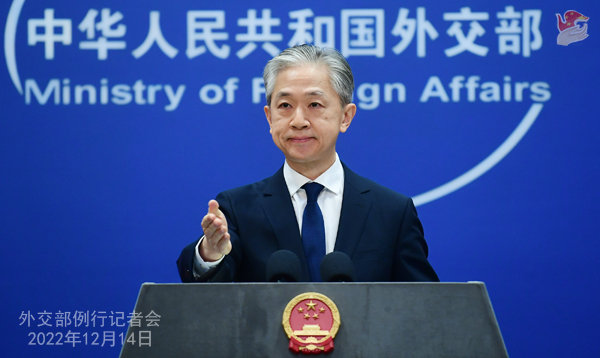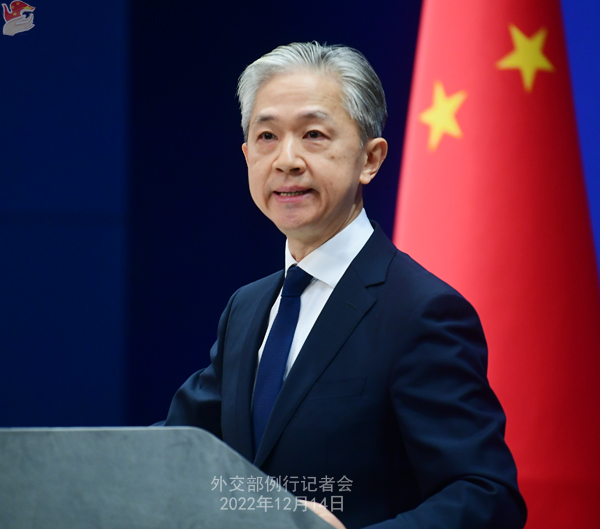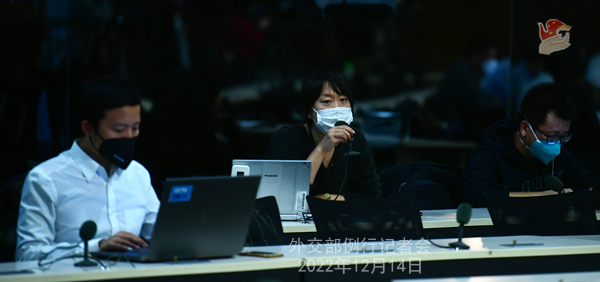
CCTV: It is reported that Google has refused the request from the government of the Hong Kong SAR to change the search rankings and display the correct national anthem of China as the top result in relevant searches. The Hong Kong SAR government said it will continue pushing Google to make that change. Do you have any comment?
Wang Wenbin: National anthem is the symbol of a country and stands for the dignity of that country. We support the Hong Kong SAR government in firmly upholding the dignity of the national anthem. Internet companies have the responsibility to deliver the correct information to the public, rather than letting the wrong information spread and mislead the public.
AFP: Japan is expected to announce its biggest defense budget in decades this week. Officially it’s to face what the Japanese side calls “a threat from China”. What is your response? Is China a threat to Japan?
Wang Wenbin: China is always committed to maintaining peace and stability in the Asia-Pacific and the world. China is a partner and opportunity for the development of all countries. The Japanese side ignores facts, deviates from its commitment to China-Japan relations and the common understandings between the two countries, and groundlessly discredits China. China resolutely opposes this and has repeatedly made our position clear to the Japanese side through diplomatic channels.
China and Japan are close neighbors and important countries in the region. Maintaining and developing friendly and cooperative relations between China and Japan is in the fundamental interests of the two countries and peoples. We once again urge the Japanese side to adhere to the principles of the four political documents between China and Japan, effectively reflect in its policies and act upon the political consensus that the two countries are cooperative partners and do not pose a threat to each other, respect the security concerns of Asian neighbors, and act prudently in the field of military security. Hyping up the “China threat” to find an excuse for its military build-up is doomed to fail.
CCTV: The US-Africa Leaders Summit opened this week in Washington. Senior US officials claimed that what China does in Africa is “not always transparent” and “that will be eventually destabilizing”, and that the US remains the “partner of choice” in Africa. Do you have any response?
Wang Wenbin: Supporting Africa’s development is the common responsibility of the international community. We are always happy to see Africa diversify its cooperation partners, and we welcome greater international focus on and investment in Africa, including from the US, as well as cooperation with Africa which is genuinely equal-footed and mutually-beneficial.
We also hope that the US will view China-Africa cooperation with an open mind. Africa is not a wrestling ground for major-country rivalry, still less a target of strong-arm tactic from a certain country or certain people. African countries and people have the wisdom and capability to choose cooperation partners who can help advance African interests. They themselves are best positioned to tell who wants what’s best for the continent.
China is Africa’s good friend, partner and brother. Our cooperation with Africa is equal-footed, win-win, aboveboard and fruitful. It is warmly welcomed by the people of Africa. The US needs to respect the aspiration of the African people and take concrete actions to advance Africa’s development, instead of being bent on smearing and attacking other countries.

Bloomberg: China sent Vice Premier Hu Chunhua to Iran recently, where China’s top leader visited in 2016. Xinhua didn’t mention the protests in Iran when it reported on Hu’s visit. Is China trying to distance itself from Iran as it deals with the protests?
Wang Wenbin: China maintains friendly exchanges with Iran. Vice Premier Hu Chunhua recently visited Iran and met with Iranian President Ebrahim Raisi and held talks with First Vice President Mohammad Mokhber. They had in-depth discussions on consolidating political mutual trust between China and Iran and promoting practical cooperation in various fields. China is ready to pursue sustained and sound growth of bilateral relations with Iran on the basis of equality and mutual benefit. The domestic situation in Iran is its internal affair, and we will not comment on it.
Shenzhen TV: On December 8, representatives of the Pacific Islands Forum spoke at the Commemoration of the 40th anniversary of the adoption and opening for signature of UNCLOS at the UN. They pointed out that the impacts of nuclear contamination on the Pacific, both transboundary and intergenerational, should be avoided, and reaffirmed the importance of ensuring international consultation, international law, and independent and verifiable scientific assessments when it comes to nuclear contamination. The Forum’s panel of independent experts noted that there is insufficient data to classify the impending discharge by Japan as safe for Pacific people and the ocean’s biodiversity. The experts have advised a deferment to the impending discharge into the Pacific Ocean by Japan is necessary and encouraged consideration for options other than discharge. What’s China’s comment?
Wang Wenbin: China has noted the statement made by the Pacific Islands Forum. Their voice again shows the international community’s grave concern about Japan’s disposal of the nuclear-contaminated water in Fukushima.
It must be pointed out that the ocean discharge of nuclear-contaminated water could affect the global marine environment and the public health of relevant countries. It is by no means a private matter for Japan. Regrettably, however, more than a year has passed and the Japanese government still hasn’t offered a full and convincing explanation on key issues like the legitimacy of the discharge plan, the reliability of data on the nuclear-contaminated water, the efficacy of the treatment system or the uncertainty of environmental impact. Neither has it conducted thorough and meaningful consultation with stakeholders, including its neighboring countries. Despite the fact that the IAEA Task Force is still in the middle of an ongoing comprehensive review and has yet to reach a final conclusion, the Japanese side forcibly pushed forward its ocean discharge plan. Such a move disregards other parties’ concerns and attempts to create a fait accompli. This is extremely irresponsible.
China once again urges the Japanese side to take seriously all parties’ legitimate concerns, stop pushing through the ocean discharge plan, have full consultation with stakeholders including neighboring countries and Pacific Island countries and relevant international institutions, find a proper way to treat the nuclear-contaminated water, including alternatives to ocean discharge, and place itself under strict monitoring of the IAEA. Before all these are delivered, Japan must not discharge the contaminated water into the ocean.
Kyodo News: It is reported that Japanese Foreign Minister Yoshimasa Hayashi will visit China at the end of this month. Can you confirm this?
Wang Wenbin: China and Japan have maintained exchanges at various levels. A stable and constructive China-Japan relationship that meets the needs of the new era serves the interests of both countries. As for the specific visit you asked about, I have nothing to share at the moment.
Dragon TV: On December 12, the European Council stated in a press release that the European Union reaffirms its commitment to the full and effective implementation of a restored JCPOA. However, Iran has not made the necessary decisions. On the same day, High Representative of the EU for Foreign Affairs and Security Policy Josep Borrell said in an interview that “I think that we do not have a better option than the JCPOA to ensure that Iran does not develop nuclear weapons.” He said this is why other issues related to Iran need to be separated from the nuclear issue. Do you have a comment on that?
Wang Wenbin: China attaches importance to the EU’s position which you cited on the Iranian nuclear issue. We welcome the EU’s reiteration of its commitment to restoring the JCPOA and continuing its diplomatic and political efforts, and call for separating the Iranian nuclear issue from other issues related to Iran.
Negotiations on resuming compliance with the JCPOA face serious complexities, but there is still hope to reach an agreement. All parties need to stay committed to dialogue and negotiation and step up diplomatic effort to bring the JCPOA back on track as soon as possible. Iran has recently shown goodwill and flexibility on some outstanding issues of the negotiations. The US needs to respond to that positively and find ways to work with Iran for the negotiations to achieve early result. In the meantime, the other parties also need to work together and take positive and constructive steps to create a favorable atmosphere for the negotiations. To tie the Iranian nuclear issue with other issues or tighten sanctions and pressure on Iran unilaterally will only lead the negotiations to a dead end and even undo previous diplomatic efforts.
China supports the EU in playing a more active mediating role for the negotiations to resume and an agreement to be reached at an early date. China will continue to work with parties concerned to contribute to the political and diplomatic solution to the Iranian nuclear issue, uphold the international nuclear nonproliferation regime and safeguard peace and stability in the Middle East.

AFP: I have a similar question as the one asked by CCTV. US Defense Secretary Lloyd Austin told African leaders yesterday that China and Russia could destabilize Africa. Do you have any reaction to these remarks?
Wang Wenbin: My answer to a previous question also covers yours. We hope the US will view Africa’s cooperation with China and other countries with an open mind. The US needs to respect the aspiration of the African people and take concrete actions to advance Africa’s development, instead of being bent on smearing and attacking other countries.
Bloomberg: US lawmakers have introduced legislation that could cut Huawei and other foreign firms from the US financial system. This is part of the US’s push to curb China’s tech ambitions. Does the ministry want to respond to this?
Wang Wenbin: We are firmly against the US’s moves to overstretch the concept of national security and abuse state power to wantonly hobble Chinese companies. Undermining international rules will eventually backfire on the US itself. The US is lifting the rock only for it to fall on the US’s own feet. China will firmly safeguard the legitimate and lawful rights and interests of Chinese companies.
AFP: Question about the Kabul terrorist attack on Monday. Do you have any update on the casualties? Can you confirm if any Chinese nationals were killed?
Wang Wenbin: Apart from what was shared with you yesterday, I have nothing to add at this moment.
Bloomberg: The Biden administration plans to put Yangtze Memory Technologies and more than 30 other Chinese firms on a trade blacklist that would prevent them from buying certain US components. Companies on the Entity List are blocked from buying technology from US suppliers until they get a special export license from the US government. Does the ministry have a response to this?
Wang Wenbin: The US has been stretching the concept of national security,abusing export control measures, engaging in discriminatory and unfair treatment against enterprises of other countries, and politicizing and weaponizing economic and sci-tech issues. This is blatant economic coercion and bullying in the field of technology. What the US has been doing gravely undermines the normal business activities between Chinese and American companies. It is detrimental to market rules and the international trade order, and gravely threatens the stability of the global industrial and supply chains. It is not in the interests of China, the US or the whole world.
China will resolutely safeguard the lawful rights and interests of Chinese companies and institutions.


 中文
中文 English
English